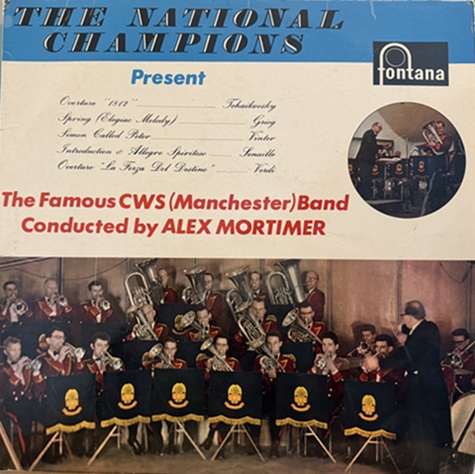
CWS (Manchester) Band
Conductor: Alex Mortimer
Soloist: Lyndon Baglin
Fontana Recordings: TL 5199
Few bands retain an aura of almost mythical reverence long after they have taken their final bow from the contest stage. Not so CWS (Manchester) under Alex Mortimer.
Their last major contest appearance under his baton was in 1972, although it was during a purple patch of success during the 1960s (National Championship wins in 1962 and 1963, British Open victories in 1960 and 1966) that their legacy was secured.
Intoxicating blend
It came from the musical approach elicited by the MD; an intoxicating blend of brilliance and bombast stamped with individuality that had a maverick quality that at its best no one could match.
To modern ears it is playing very much of its era; the use of vibrato and rubato on the high pitch instruments giving the ensemble and solo lines a bright, oscillating quality shaped by the MD like a potter with soft clay in his hands.
This recording from 1963 is a band at its zenith; recorded soon after their legendary ‘Force of Destiny’ victory at the Royal Albert Hall. The sleeve notes come from Gilbert Vinter, who describes them as, “surely the most accomplished Band in the world today”, and where “Alex Mortimer’s control is complete in every detail.” You would be hard pressed to argue against him.
To modern ears it is playing very much of its era; the use of vibrato and rubato on the high pitch instruments giving the ensemble and solo lines a bright, oscillating quality shaped by the MD like a potter with soft clay in his hands.
Porcelain glaze
The finished article though is fired with a porcelain glaze of assured brilliance – the performance of ‘Force of Destiny’ driven with passionate verve from start to finish. It has a mesmeric sense of musical engagement led by the superb principal cornet, Derek Garside.
the performance of ‘Force of Destiny’ driven with passionate verve from start to finish. It has a mesmeric sense of musical engagement led by the superb principal cornet, Derek Garside.
Vinter’s own ‘Simon Called Peter’ also has an engrossing presence – a showcase of spiritual adventurism in style and tempo, the rather rudimentary percussion effects surprisingly effective. Vinter reveals that the recording was made just a week after the piece was sent to the band (“...almost as fast as one of Mr Mortimer’s allegro’s!”)
Majestic
There is however a majestic assuredness to Lyndon Baglin’s playing on Senaille’s ‘Introduction and Allegro Spiritoso’, beautifully articulated in style, whilst Alex Mortimer pays malleable deference to Grieg’s musical portraiture in the famous elegiac ‘Spring’.
Even the great ‘Le Petit Caporal’ would have known when to have thrown the towel in against a band and their martinet general on this form.
As for the approach to Tchaikovsky’s ‘1812’? Perhaps Gilbert Vinter’s description that the enjoyment and spirit shown by each player, let alone the MD, was “enough to defeat Napoleon single handed!” sums it up perfectly.
Even the great ‘Le Petit Caporal’ would have known when to have thrown the towel in against a band and their martinet general on this form.
Iwan Fox
Track Listing:
Side 1:
1. Overture: 1812 (Tchaikovsky arr. Denis Wright)
2. Spring (Elegiac Melody Op. 34, No. 2) (Grieg arr. Pat Ryan)
Side 2:
1. Simon Called Peter (Gilbert Vinter)
2. Introduction and Allegro Spiritoso (J.B. Senaille arr. Denis Wright)
Soloist: Lyndon Baglin
3. Overture: La Forza del Destino (Verdi arr. Frank Wright)









